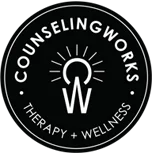Yes, recovery from PTSD is possible, and therapy provides a structured, supportive environment to process traumatic events and reduce their impact on your life. A trained therapist can guide you through evidence-based treatments intended to help you manage symptoms and reclaim your sense of safety.
Trauma & PTSD
Therapy for Trauma & PTSD
Healing from Trauma is Possible
When an individual suffers from a traumatic event, like sexual assault, a car accident, or witnessing severe violence, he or she can suffer from lingering trauma for years afterward. One specific disorder trauma victims often face is post-traumatic stress disorder (PTSD). We offer therapy solutions at Counseling Works to help you heal following trauma.
What is Trauma?
Trauma occurs when you experience or witness a difficult, stressful, or violent event that damages your sense of security. Trauma can be caused by one event or a lifetime of small losses, injuries, or unmet needs. Whatever the source of your trauma, the result is an actual change in the way your brain processes the world around you. Trauma triggers the bodily response that is often referred to as “fight or flight,” which causes people to be on high alert and experience elevated levels of stress.
What is PTSD?
PTSD is a condition that occurs after trauma. While “disorder” is in the name, PTSD may be more accurately called a post-traumatic stress injury. Like a bodily injury, the trauma wounds that lead to PTSD need to be healed.
How Do PTSD & Trauma Affect Me?
Trauma injuries and PTSD impact people differently, but individuals suffering from a trauma injury or PTSD can experience the following symptoms:
- Nightmares or flashbacks of the traumatic event – these flashbacks may feel like you’re physically back in the experience or they may only involve one sense like hearing the sounds or thinking you see people
- A loss of interest in or satisfaction from the activities you once enjoyed
- Emotional detachment from loved ones and family
- Difficulty sleeping or sleeping too much
- Avoiding reminders of the trauma, such as not going to similar settings or refusing to talk to people who were involved
- Social withdrawal or isolation
- Self-destructive, promiscuous, or self-harming behaviors
- Hostility, mood swings, and irritability
- Hyper-vigilance, worry, paranoia, or panic attacks
- Physical symptoms like increased heart rate, sweating, and shallow breathing
How Does Therapy Help with Trauma & PTSD?
Trauma wounds us, but therapy can help you begin to heal. The therapy process to heal from trauma may include a variety of specific approaches based on your unique needs. The goal of whatever therapy technique we use is to help you process the painful thoughts and emotions that arise after trauma. Specifically, we will help you center yourself in the present moment, so you can free yourself from the ways that trauma affects your mood, thinking, and behavior.
Ready to Work with an Experienced Counselor?
If you are struggling with PTSD and other lingering effects of trauma, work with an experienced counselor to treat your symptoms. Contact our team at Counseling Works today to schedule your first appointment with a counselor who specializes in working with trauma survivors and PTSD management and can give you the professional help you need.
FAQs About Trauma & PTSD Therapy in Illinois
Why do I feel so disconnected from myself and others?
Feeling detached or emotionally numb is a common protective response to trauma, as your mind tries to create distance from overwhelming pain. Therapy can help you gently reconnect with your emotions and rebuild the meaningful connections with yourself and others that trauma has disrupted.
Can trauma cause physical pain or tension in the body?
Absolutely; the body often holds onto the stress of trauma, which can manifest as chronic pain, muscle tension, fatigue and other physical symptoms. Therapeutic approaches can help release this stored tension and address the deep connection between your mind and body.
What should I do when I feel triggered by something unexpected?
When a trigger occurs, grounding techniques can help bring you back to the present moment and a therapist can equip you with individualized strategies to manage these intense reactions. In therapy, you will learn to identify your triggers and develop skills to navigate them effectively, reducing their power over you.
Why is it so hard to trust people after what I’ve been through?
Trauma can shatter your sense of safety and make it incredibly difficult to trust others, which is a normal response to having your trust violated. Therapy offers a safe and confidential relationship where you can explore these fears and slowly learn to build healthy, trusting connections again at your own pace.
How do I build resilience after going through something so difficult?
Building resilience is a process of rediscovering your inner strength and developing new coping skills, which is a central focus of trauma-informed therapy. Your counselor will support you in transforming your experience into a source of strength, empowering you to move forward with hope and confidence.
OUR THERAPISTS SPECIALIZING IN TRAUMA & PTSD

What Our Clients Say

Contact Us
We look forward to connecting with you. Please contact us to schedule your first appointment or to learn more about our services.
























